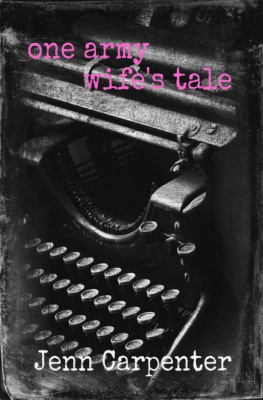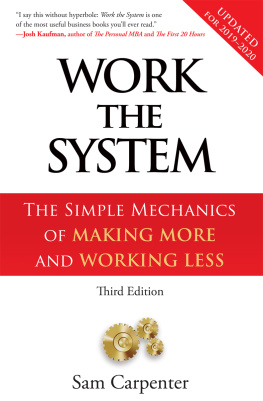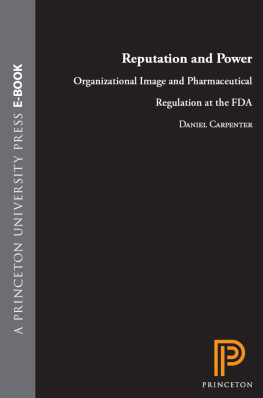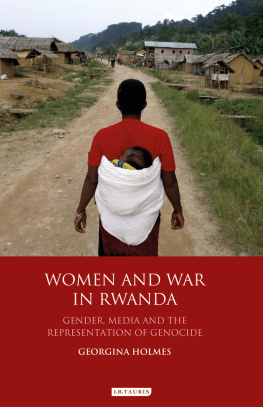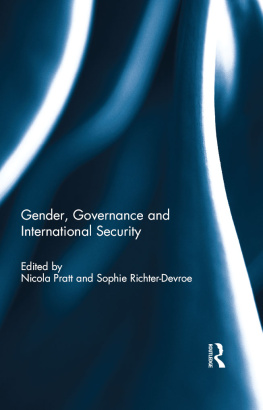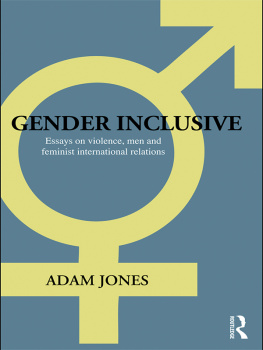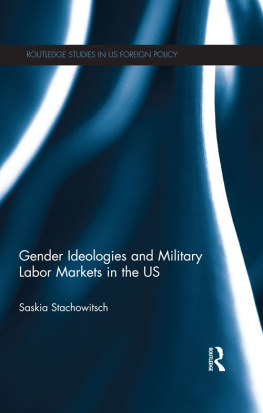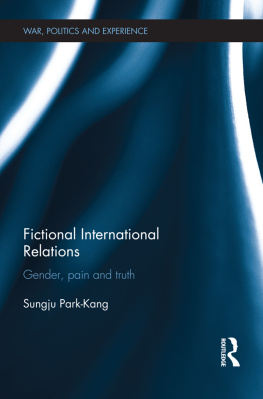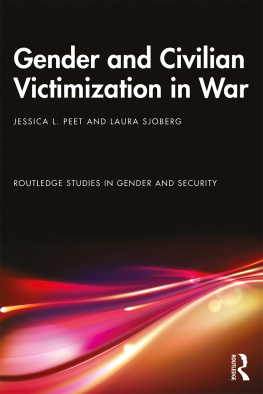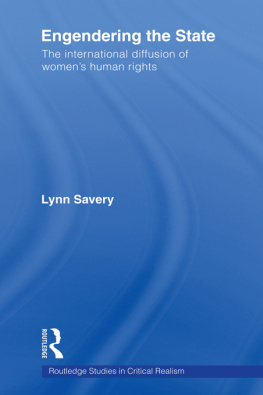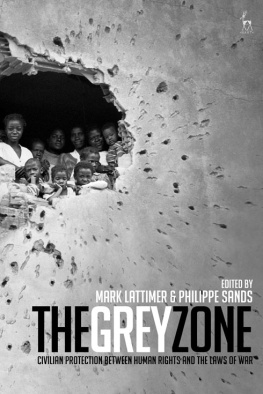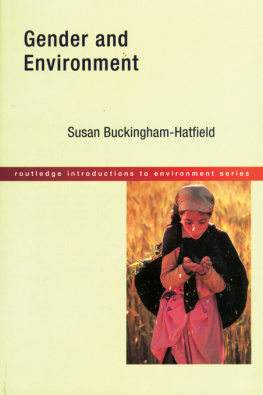INNOCENT WOMEN AND CHILDREN
Gender in a Global/Local World
Series Editors: Jane Parpart, Pauline Gardiner Barber and Marianne H. Marchand
Gender in a Global/Local World critically explores the uneven and often contradictory ways in which global processes and local identities come together. Much has been and is being written about globalization and responses to it but rarely from a critical, historical, gendered perspective. Yet, these processes are profoundly gendered albeit in different ways in particular contexts and times. The changes in social, cultural, economic and political institutions and practices alter the conditions under which women and men make and remake their lives. New spaces have been created economic, political, social and previously silent voices are being heard. North-South dichotomies are being undermined as increasing numbers of people and communities are exposed to international processes through migration, travel, and communication, even as marginalization and poverty intensify for many in all parts of the world. The series features monographs and collections which explore the tensions in a global/local world, and includes contributions from all disciplines in recognition that no single approach can capture these complex processes.
Also in the series
(En)Gendering the War on Terror
War Stories and Camouflaged Politics
Edited by
Krista Hunt and Kim Rygiel
ISBN 0 7546 4481 2
Women, Migration and Citizenship
Edited by
Evangelia Tastsoglou and Alexandra Dobrowolsky
ISBN 0 7546 4379 4
Transnational Ruptures
Gender and Forced Migration
Catherine Nolin
ISBN 0 7546 3805 7
The Gender Question in Globalization
Changing Perspectives and Practices
Edited by
Tine Davids and Francien van Driel
ISBN 0 7546 3923 1
Innocent Women and Children
Gender, Norms and the Protection of Civilians
R. CHARLI CARPENTER
University of Pittsburgh, USA
ASHGATE
R. Charli Carpenter 2006
All rights reserved. No part of this publication may be reproduced, stored in a retrieval system or transmitted in any form or by any means, electronic, mechanical, photocopying, recording or otherwise without the prior permission of the publisher.
R. Charli Carpenter has asserted her moral right under the Copyright, Designs and Patents Act, 1988, to be identified as the author of this work.
Published by
Ashgate Publishing Limited
Gower House
Croft Road
Aldershot
Hampshire GU11 3HR
England
Ashgate Publishing Company
Suite 420
101 Cherry Street
Burlington, VT 05401-4405
USA
Ashgate website: http://www.ashgate.com
British Library Cataloguing in Publication Data
Carpenter, R. Charli
Innocent women and children : gender, norms and the
protection of civilians. - (Gender in a global/local world)
1. Combatants and noncombatants (International law) 2. War
victims - Legal status, laws, etc. 3. Intervention
(International law)
I. Title
341.6'7
Library of Congress Cataloging-in-Publication Data
Carpenter, R. Charli.
Innocent women and children : gender, norms and the protection of
civilians / by R. Charli Carpenter.
p. cm. -- (Gender in a global/local world)
Includes bibliographical references and index
ISBN 0-7546-4745-5
1. War--Protection of civilians. 2. War victims--Legal status, laws,
etc. 3. Combatants and noncombatants (International law) 4. Women
and war. 5. Children and war. I. Title. II. Series.
KZ6515.C37 2006
341.6'7--dc22
2005034914
ISBN 0 7546 4745 5
ISBN 9781409495680 (ebk-ePUB)
Printed and bound in Great Britain by Antony Rowe Ltd, Chippenham, Wiltshire.
Contents
List of Figures and Tables
Preface and Acknowledgements
Throughout the 1990s, it was commonplace in international security and human rights discourse to argue that women and children constitute the primary civilian victims in armed conflict. In October 2005, the Liu Institute launched a report providing a wealth of epidemiological data debunking this claim, but the argument that women and children are disproportionately affected by war continues to be reiterated in many policy circles concerned with the protection of war-affected civilians. The point of Innocent Women and Children is not simply to unpack this view and examine it as the deeply gendered construct that it is, but also to explore how the association of women and children with the concept of the innocent civilian affects and undermines the protection of civilians in international society.
Many individuals and institutions contributed to the genesis and evolution of this project. My greatest debt is owed to Ron Mitchell, who taught me how to ask good why questions, encouraged my unorthodox approach and always took the project seriously. Yosef Lapid was the first to expose me to the writings of Cynthia Enloe and the radical idea (to me, back then) that gender could matter independently of other considerations in shaping world politics. Robert Keohanes work inspired me to talk about gender as if it should matter to mainstream IR theorists, and he has provided necessary feedback and mentorship along the way. Helen Kinsellas genealogy of the civilian got me thinking about knowledge claims in IR theory, and she has been a helpful source of critique as Ive developed and refined my own explanatory claims. Robert Darst opened my eyes to the study of humanitarian affairs, schooled me in the use of irony as an emotional bulwark, and provided the catalyst to change direction at a number of critical junctures. Adam Joness work on sex-selective massacre sparked the insight that led to this empirical study, and I will never forget his thoughtful reply to a curious graduate students email: this letter sparked a friendship and intellectual engagement for which I am deeply appreciative. Julie Mertus critiqued several versions of the Srebrenica case study and gave me clues about the fine art of communicating across epistemological divides (though I still dont have it down pat, and any ongoing traces of ineptitude are due entirely to my own stubborn Sagittarian lack of tact). Julie also continues to provide tremendous inspiration as a teacher, practitioner, activist and theorist.
The methodology for this project involved collecting narratives from humanitarian practitioners who routinely put their lives on the line to do some of the most difficult, dangerous and important work on this planet. These conversations left me in awe of this profession, and I hope that this book honors these individuals experiences and stories while providing useful critical insights that may shape best practices for the future. I thank all those who gave precious time and emotional energy participating in or aiding this research, at the International Committee of the Red Cross (ICRC), the United Nations High Commissioner for Refugees (UNHCR), and United Nations Childrens Emergency Fund (UNICEF), for their availability, openness and insight. A particularly warm thanks to David Harland for being thoughtful, frank and amazingly reflective; to Mark Cutts and Iain Levine for time, encouragement and invaluable contacts; and to Charlotte Lindsey for shaping, refining and engaging with my ideas as they have developed.
The University of Oregon supported the data-gathering for this project with a research grant and a Jane Grant Fellowship through the Center for the Study of Women in Society, and with two Stephen Wasby research grants through the Department of Political Science. The University of Pittsburghs Graduate School of Public and International Affairs supported research-related travel as well, and faculty and staff at the University of Pittsburgh provided invaluable guidance as the final version of this book took shape: particular thanks go to Carolyn Ban, Simon Reich, William Keller, Martin Staniland, Nita Rudra, Michael Goodhart, Sandra Monteverde, Karen Chervenick, Betsy Jose-Thota, Robyn Wheeler and Marianne Nichols.
Next page

